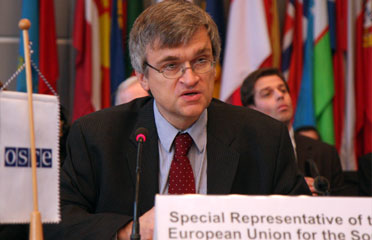
EU Diplomat: Conflicts ‘Primary Threat’ to South Caucasus Stability

| EU Special Representative for the South Caucasus Peter Semneby addresses the OSCE Permanent Council, February 10. Photo: OSCE/Sarah Crozier |
Peter Semneby, EU’s special representative for South Caucasus, called for strengthened EU and OSCE engagement in the region and for intensifying “human security approach” in conflict prevention measures.
Speaking at the OSCE Permanent Council in Vienna on February 10, Semneby said that unresolved conflicts in the South Caucasus remain “the primary threats to the region’s stability” and added that the security situation in Nagorno-Karabakh was of particular concern.
“EU engagement in the South Caucasus must continue to be visible, strong and consistent,” he said.
“Due to further conflict potential in the region, conflict prevention remains an indispensable priority alongside the handling of the existing protracted conflicts,” Semneby said. “Conflict prevention and mitigation require a human security approach in addition to the political approach of official negotiations and security-related deployments.”
“This approach focuses on the role of individuals and requires a different set of instruments by the international community, such as support to civil society to allow for a strengthened civic culture and community dialogue,” he said.
“International actors need to remain fully committed in efforts to stabilize, manage and resolve the conflicts. In particular this includes a strong engagement of the OSCE throughout the region. The loss of the OSCE Mission in Georgia has been very keenly felt by OSCE’s partners.”
OSCE mission in Georgia was closed down after Russia blocked extension of its mandate after the August, 2008 war.
The EU diplomat said that the OSCE remained a key partner for the EU in the South Caucasus in the area of democracy promotion, rule of law, human rights, and freedom of the media.
“I am therefore convinced that the OSCE needs to find a way re-launch its human dimensions activities in Georgia. These activities should not be held hostage by the conflict agenda. The termination of the mission left not only a vacuum in the field of conflict prevention and resolution but also in the area of democratization and human rights,” he said.
On February 9, Georgian First Deputy Foreign Minister Nikoloz Vashakidze addressed the Forum for Security Cooperation, OSCE’s body which meets weekly in Vienna to discuss and make decisions regarding military aspects of security in the OSCE area.
According to the Georgian Foreign Ministry, Vashakidze briefed the Forum for Security Cooperation about details of “the locations and composition of Russian armed forces” deployed in breakaway Abkhazia and South Ossetia “with a particular focus on the newly introduced offensive weaponry.”
Vashakidze “stressed that Russia exercised effective control over Georgia’s occupied regions by seconding citizens of Russia with military and security background to serve in the proxy regimes of Tskhinvali and Sokhumi.”
“The Georgian side believes that one way to ensure relative stability and security in the occupied regions is to keep international community fully informed of the ongoing militarization process of the occupied regions. In this context, the Ministry of Foreign Affairs believes that the presentation in Vienna was fruitful and purposeful,” the Georgian MFA said.
This post is also available in: ქართული Русский